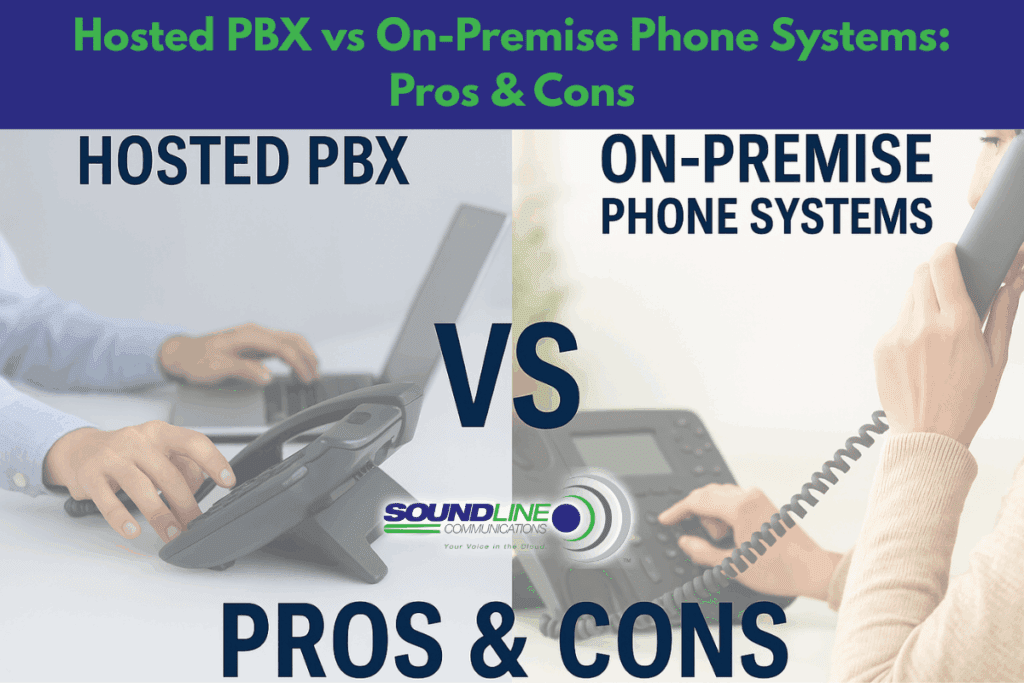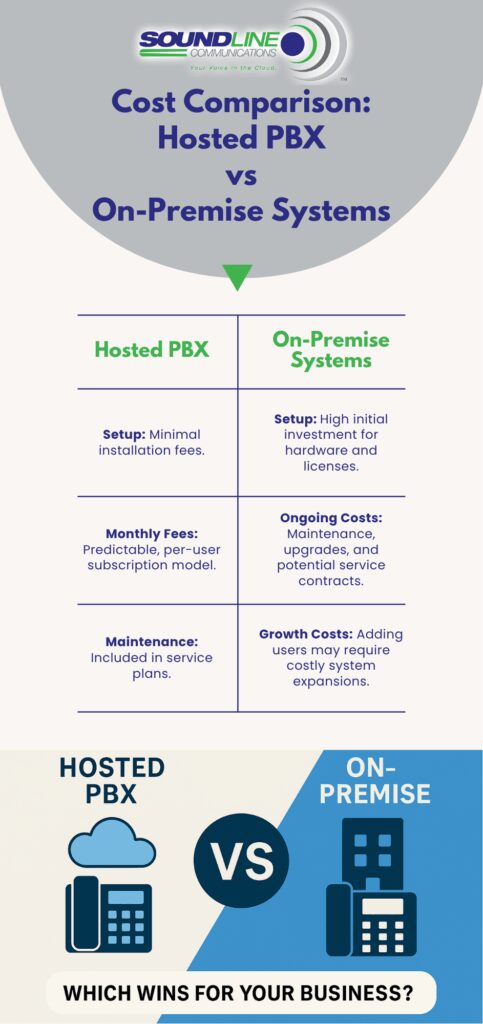Hosted PBX vs On-Premise Phone Systems: Pros & Cons

Choosing the right business phone system is a major decision that impacts your efficiency, customer service, and long-term costs. Whether you’re a growing business or looking to modernize, understanding the differences between Hosted PBX and On-Premise phone systems is critical.
At Soundline Communications, we pride ourselves on offering the best service, best customer care, and real people you can talk to when you need help. This guide will help you weigh the pros and cons of each system to make the right decision for your business.
What is a Hosted PBX?
A Hosted PBX (Private Branch Exchange) is a cloud-based phone system managed by a service provider. Instead of housing bulky equipment onsite, your business phones connect through the internet to an offsite server.
Key Features:
- Cloud-based
- Minimal onsite equipment
- Managed maintenance and updates
- Easy scalability
Pros:
- Lower Upfront Costs: No expensive hardware purchases.
- Simplified Maintenance: Providers like Soundline Communications handle updates and repairs.
- Remote Flexibility: Ideal for remote and hybrid workforces.
- Quick Setup: Go live faster with minimal disruption.
Cons:
- Internet Dependency: Requires a stable and robust internet connection.
- Recurring Costs: Monthly subscription fees add up over time.
- Less Customization: Some highly specialized configurations may be limited.
What is an On-Premise Phone System?
An On-Premise Phone System means you purchase and manage your own PBX hardware onsite. Your internal IT team or a third-party specialist is responsible for maintaining it.
Key Features:
- Hardware owned and operated onsite
- Full control over system settings
- High customization potential
Pros:
- Greater Control: Customize and manage every aspect.
- No Ongoing Subscription Fees: Only maintenance and upgrades cost after installation.
- Enhanced Security: Data remains within your internal network.
Cons:
- High Upfront Costs: Significant investment in hardware and licensing.
- Complex Maintenance: Requires in-house expertise or third-party support.
Scalability Challenges: Upgrades often require new hardware purchases.

Cost Comparison: Hosted PBX vs On-Premise Systems
Hosted PBX Costs:
- Setup: Minimal installation fees.
- Monthly Fees: Predictable, per-user subscription model.
- Maintenance: Included in service plans.
On-Premise Costs:
- Setup: High initial investment for hardware and licenses.
- Ongoing Costs: Maintenance, upgrades, and potential service contracts.
- Growth Costs: Adding users may require costly system expansions.
Key Takeaway: If you prefer predictable monthly costs and lower initial investments, Hosted PBX is generally the smarter choice. For companies seeking total ownership and control, On-Premise may suit your needs — if you’re ready for the upfront expenses.
Setup and Scalability: What to Expect
Hosted PBX:
- Ease of Setup: Deploy within days, not weeks.
- Scalability: Effortlessly add or remove users without physical upgrades.
- Remote Ready: Setup for remote offices or workers instantly.
On-Premise:
- Complex Setup: Longer installation timelines and more planning.
- Scaling Up: Requires hardware additions and complex reconfiguration.
- Physical Limitations: Office size and infrastructure can restrict growth.
Key Takeaway: For businesses that anticipate rapid growth or remote team expansion, Hosted PBX offers unbeatable agility.
Feature Comparison: Hosted PBX vs On-Premise
Hosted PBX Features:
- Auto-attendants
- Voicemail-to-email
- Video conferencing integrations
- Mobile apps for remote access
- Easy integration with CRM and Medical Software Integration Services
On-Premise Features:
- Advanced call routing (custom)
- Complete system control
- Deep integrations, but require manual setup
Modern Hosted PBX systems, like those provided by Soundline Communications, deliver robust features comparable to traditional On-Premise setups — with none of the maintenance headaches.
Key Takeaway: Hosted PBX platforms offer a comprehensive feature set suitable for modern businesses, especially those needing “Medical Software Integration Service near me” capabilities or remote flexibility.
Conclusion: Which System is Right for You?
Choosing between a Hosted PBX and an On-Premise Phone System ultimately depends on your business’s size, growth trajectory, IT resources, and budget.
- Choose Hosted PBX if you want: Lower upfront costs, easy scalability, remote work capabilities, and professional support from real people who understand your needs.
- Choose On-Premise if you need: Total control, have an internal IT team, and can afford a larger initial investment.
Ready to upgrade your communication experience? Soundline Communications is here to guide you every step of the way. Our team delivers best-in-class service, seamless setup, and real customer support when you need it.
Learn More About Our Hosted PBX Solutions
FAQs
Is Hosted PBX secure enough for sensitive business communications?
PBX providers like Soundline Communications implement rigorous security protocols including encryption, firewalls, and network monitoring.
How long does it take to set up a Hosted PBX system?
Most Hosted PBX setups can be completed within a few days, depending on your business size and readiness.
Can Hosted PBX integrate with our Medical Software Systems?
Absolutely. Soundline Communications specializes in Medical Software Integration Services, ensuring seamless connectivity for healthcare businesses.
